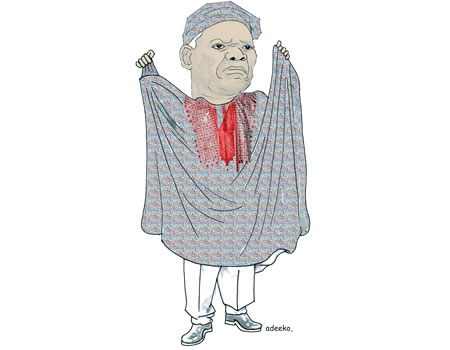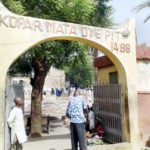We must not easily forget:
- i) that the people of different sections of what is today called Nigeria had perfected the arts of trading and living reasonably harmoniously with one another centuries before what was called ‚the 1914 amalgamation of the North and the South‘ by the British;
iii) that the Nigerian polity was amalgamated by the British irrespective of ethnic and cultural differences and were structured into three lopsided regions up to the 1960 independence;
- iv) that the various constitutions used to govern Nigeria‘s three regions from 1950 up to 1963 resulted from serious negotiations among the political leaderships of the then three regions;
- v) that the 1963 census, the widely boycotted Nigerian Federal elections of 1964, and the massively rigged election of 1965 in the West led to the eventual collapse of the First Republic and subsequently led to a 13-year military rule from 1966 to 1979, during which period Nigeria‘s original three regions were restructured into 12 and later 19 states;
- vi) that another experiment at democracy during the shortlived Second Republic, 1979 -1983, collapsed as a result of massive rigging of the 1983 general elections;
- vi) that a succession of military governments ruled from 1983 -1999; and, in the process, reduced the Nigerian federal system of government to mere pretences at practising federalism in the country;
vii) that those successive military governments restructured Nigeria into 36 non-viable and non-homogeneous states; and, at the same time, used decrees to bleach the states (federating units) of all sources of internally generated revenue, while throwing „like crumbs“ only 22% and 24% of the revenues in the Federation Account to 36 States and over 700 Local Governments respectively for sharing among themselves with some somewhat obnoxious formulae;
viii) that the military-in-politics, among themselves, their contractor agents, and many public officers as collaborators, frittered away, through self-aggrandizement, the bulk of the resources of this country. The result are constant communal feuds for [the creation of] more states and more local governments by other vocal citizens looking for opportunities to become councilors, governors and/or commissioners“;
- ix) that, all along, the traditional rulers in Nigeria had constituted problems for their subjects by serving as agents of the international slave merchants, as indirect rulers under the British colonial exploitation, as collaborators of the military politicians in the wasteful and corrupt management of the country‘s resources;
- x) that the military-in-politics succeeded in splitting the political class into „the old and the new breeds“ as a divide-and-rule tactic to perpetuate dictatorship and to entrench waste and corruption which now form the basis for the present unabashed demonstration of indiscipline among political leadership and which has now become dangerous to our country‘s socioeconomic advancement;
- xi) that the international powers used the military in politics to „SAP“ the Naira and to subject the Nigerian economy to the manipulation of the International Monetary Fund (IMF) and the World Bank, and similar institutions set up by the stronger to exploit the weaker nations of the world;
xii) that the history of Nigeria provided indeed the basis for choosing to practice „Democratic Federalism“, as opposed to a unitary arrangement;
xiii) that our fledgling democracy was in such a delicate state as to threaten the very survival of Nigeria as one country and, in such a delicate fake federalism as we had, nothing was certain, the stability of the polity could not be taken for granted, jostling for power by all means and at all costs could degenerate to a state of anarchy where man could be a threat to his fellow men, depending on the sophistication of the arsenal of power available to each person;
xiv) that, in such a resultant state of anarchy, disorder could reign and society might consequently lack security of life, security of property, security of food, security of energy for transportation…Or how else do we describe the present state of economic chaos in Nigeria, manifesting as ethno-religious masquerades like Boko Haram, IPOB, etc? But the problems were easily discernible and could have been nipped in the bud if our leaders had cared to see reason and thus act responsibly;
- xv) that Nigeria’s inability to pursue science-based technology, instead of the present disproportionate emphasis on service-oriented businesses, pushed agricultural and industrial enterprises and productivity to the background of our economy – a situation which has resulted in the large and still-growing armies of unemployed and unemployable youths roaming the streets, in increasing poverty and hunger, in resent and tension, and thus fueling insecurity to life and property among the entire citizenry;
xvi) that Nigerian voters too have since become frustrated and apathetic; thus, it today requires a lot of money to mobilise them to perform their civic duty of electing people to represent them at various levels of government. As a result, only the rich is in the position to buy his way to power; and, like modern religious evangelism, politics in Nigeria has become a lucrative business for the winners;
xvii) that by Decree 21 of 1998, the military transferred all powers of taxation from the states and local governments to the Federal Government, thereby rendering the states financially helpless and virtually totally dependent on funds from the sale of crude oil controlled by the centre.
From then, the Federal Government has uniformised poverty across the country and, perhaps unwittingly, democratized widespread discontent among our various people. Consequently, we now witness frequent agitations exemplified by acts of political and religious violence, armed robbery, kidnapping, cyber-crimes – even brain drain/waste among Nigeria’s highly educated and competent professionals who cannot get adequate outlets for the gainful employment of their skills within the country’s fast shrinking economy;
xviii) that the prevalent clamour for distinct national groups to be entitled to countries of their own, and to be free to pursue their own destinies according to their own lights, cultures, histories, and endowments/resources – both natural and human – were being repressed with coercion. Experiences with erstwhile failed countries of Yugoslavia and Czechoslovakia still remain vivid: in each case, several nations were grouped together as a single country; of course, each country eventually disintegrated, violently in the case of Yugoslavia but peacefully in that of Czechoslovakia.
xiv) that, like in Nigeria, there are global demands for devolution of more powers from the central to the constituent national groups as we presently witness in Spain (Catalonia), Italy (Lombardi), United Kingdom (among Scots, Welsh, Irish, English). These are pointers to the inescapable fact that a truly negotiated federalism, like was done in bringing about the 1960 Constitution of Nigeria, not by coercion, would be the best panacea for harmonious co-existence among various nationalities and religious groups in Nigeria.
In other words, to move towards amicably ameliorating our country’s multi-faceted problems,
scientific technology must be used to ensure that our future population censuses must be made accurate;
- ii) our zones/regions in their amicable variants must be recognized as the first-line federating units;
iii) the exclusive functions of the Federal Government must be largely off-loaded and shared among the federating units;
- iv) revenue allocation system must be related to tax efforts and the quantum and complexity of functions assigned to each tier of government; and
- v) the present formula for allocating revenue among the 774 local governments directly from Abuja must be discarded and replaced with a more equitable formula which could encourage allocation to local governments by their states according to the dictates of their different Houses of Assembly.
In his Foreword to my book “Restructuring: Nigeria’s Approach to True Federalism” (April 2003), Senator Abraham Adesanya wrote:
“I have this strong feeling in me that Nigeria would not die with its potential only if it could take a cue from the salad bowl which contains lettuce, cabbage, cream, etc, in proper mix to form a delicacy. None of the ingredients disturbs the other.
If Nigeria would allow its various component units to retain their identities like the ingredients in the salad bowl, a great nation would emerge from the present rot.”
- Chief Akande’s, immediate chairman of the governing All Progressives Congress (APC), delivered this goodwill message to the South-West Development Summit of the Yoruba Patriots Movement on Tuesday, 7th November, 2017
WATCH TOP VIDEOS FROM NIGERIAN TRIBUNE TV
- Let’s Talk About SELF-AWARENESS
- Is Your Confidence Mistaken for Pride? Let’s talk about it
- Is Etiquette About Perfection…Or Just Not Being Rude?
- Top Psychologist Reveal 3 Signs You’re Struggling With Imposter Syndrome
- Do You Pick Up Work-Related Calls at Midnight or Never? Let’s Talk About Boundaries






